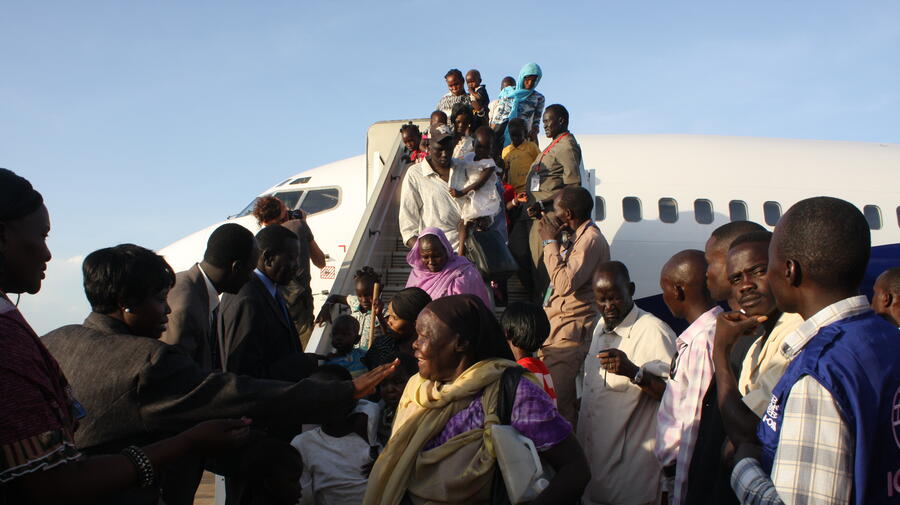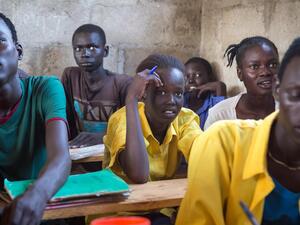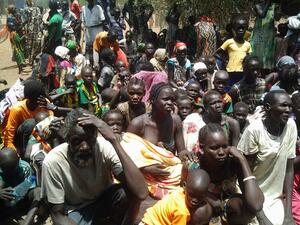First groups of stranded South Sudanese return to Juba
First groups of stranded South Sudanese return to Juba

A humanitarian airlift from Sudan to South Sudan brings more than 300 southerners home after more than a year in limbo. Thousands more will follow.
JUBA, South Sudan, May 16 (UNHCR) - A first group of 326 South Sudanese was flown home this week after waiting for many months in a congested and increasingly tense site in Sudan.
The movement on Monday is a breakthrough for some 12,000 people of South Sudanese origin, some of whom had been stranded for more than a year at Kosti, a Sudanese town on the bank of the White Nile River. They had started their journey back to their ancestral homeland when South Sudan became an independent country in July 2011, but were delayed due to a shortage of barges in Kosti and the high volume of luggage accumulated from years spent in Sudan. Some children started singing songs about "the barge that never came."
Pascalina Dokwi, a 20-year-old mother of two, arrived at the way station in Kosti in January last year. The site was originally designed for 800 people but swelled to accommodate 12,000 to 15,000 people waiting to go to the south. This put pressure on services such as water and health care. Tensions were also rising with the local community and officials.
Dokwi recalls the struggles she faced at the way station: "We were not allowed to leave Kosti, not even to go to the market for a few essentials. If we left, we risked arrest, rape, harassment and extortion."
Following a recent agreement between the two governments to facilitate the stranded group's movement to South Sudan, the International Organization for Migration (IOM) is now bussing people from Kosti to Khartoum and flying them to South Sudan's capital, Juba. UNHCR is providing protection monitoring and assisting the most vulnerable among the southerners.
The first two groups of mostly women, children and the elderly touched down in Juba on Monday morning to an overwhelming welcome by South Sudan officials, including the minister for humanitarian affairs and the chairperson of the Relief and Rehabilitation Commission. A UNHCR ambulance was on standby for medical emergencies.
The returnees were taken to the UNHCR way station in Juba, where the children were vaccinated and families given relief supplies. UNHCR has also set up a help desk to explain what to expect and to prepare them for their new life.
"It took me eight months to register and eight months to finally return home. I am happy," said Dokwi, who returned with her children but left her husband behind to wait for his pension. "I am not sure when he'll come, but I hope and pray he comes soon."
According to Satimo Lado, county secretary of the Relief and Rehabilitation Commission, many of the returnees will spend up to three days waiting for relatives to come and take them home.
Others may end up staying in transit facilities for months "in the hope that they will receive land in Juba from the government," he said. "Many of them do not have any relatives here in South Sudan, or cannot trace them. Some will stay as they await the arrival of their luggage [by barge], and that could take months."
They can take comfort in the experiences of Mary Abostino Jones, who returned to Juba earlier this year after spending three months in Kosti.
"I live nearby and came to see my old friends returning from Kosti," said Jones, aged "about 40" and a mother of eight. "I wanted to come back and we are doing well here. Some of my children are working in Juba and some are studying."
The humanitarian airlift is expected to continue for the next two weeks, bringing as many as 1,000 people from Sudan to South Sudan on a daily basis. The government has identified a new site in Juba to accommodate the large groups of returnees until they can return to their villages. As co-chairs of the Emergency Return Sector, UNHCR and IOM will work with other humanitarian partners to provide basic services in the transit sites.
By Mark Kirya and Vivian Tan in Juba, South Sudan









